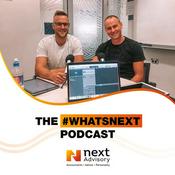394 episodes
- Diet TBPN delivers the best of today’s TBPN episode in 30 minutes. TBPN is a live tech talk show hosted by John Coogan and Jordi Hays, streaming weekdays 11–2 PT on X and YouTube, with each episode posted to podcast platforms right after.
Described by The New York Times as “Silicon Valley’s newest obsession,” the show has recently featured Mark Zuckerberg, Sam Altman, Mark Cuban, and Satya Nadella.
TBPN is made possible by:
Ramp - https://Ramp.com
AppLovin - https://axon.ai
Cisco - https://www.cisco.com
Cognition - https://cognition.ai
Console - https://console.com
CrowdStrike - https://crowdstrike.com
ElevenLabs - https://elevenlabs.io
Figma - https://figma.com
Fin - https://fin.ai
Gemini - https://gemini.google.com
Graphite - https://graphite.com
Gusto - https://gusto.com/tbpn
Kalshi - https://kalshi.com
Labelbox - https://labelbox.com
Lambda - https://lambda.ai
Linear - https://linear.app
MongoDB - https://mongodb.com
NYSE - https://nyse.com
Okta - https://www.okta.com
Phantom - https://phantom.com/cash
Plaid - https://plaid.com
Public - https://public.com
Railway - https://railway.com
Restream - https://restream.io
Sentry - https://sentry.io
Shopify - https://shopify.com/tbpn
Turbopuffer - https://turbopuffer.com
Vanta - https://vanta.com
Vibe - https://vibe.co
Follow TBPN:
https://TBPN.com
https://x.com/tbpn
https://open.spotify.com/show/2L6WMqY3GUPCGBD0dX6p00?si=674252d53acf4231
https://podcasts.apple.com/us/podcast/technology-brothers/id1772360235
https://www.youtube.com/@TBPNLive Anthropic Hits $380B Valuation, Become Unsloppable, WSJ Mansion Section | Martin Shkreli, Connor Hayes, Alex Bouzari, Brett Adcock
13/2/2026 | 3h 4 mins.Sign up for TBPN’s daily newsletter at TBPN.com
(00:51) - Anthropic Hits $380B Valuation
(06:08) - Become Unsloppable
(23:27) - 𝕏 Timeline Reactions
(45:08) - WSJ Mansion Section
(58:20) - Martin Shkreli, an American investor and former pharmaceutical executive, gained notoriety for significantly increasing the price of the drug Daraprim and was later convicted of securities fraud. In the conversation, Shkreli discusses his development of a new product that utilizes his network and AI to estimate venture capital positions in various funding rounds, highlighting significant gains by investors in companies like Anthropic and OpenAI. He also touches on the challenges of accessing accurate investment data and the potential of AI in transforming industries, emphasizing the importance of product development and sales over engineering in business success.
(01:34:32) - Connor Hayes, a product leader at Meta, discusses the development and growth of Threads, emphasizing its unique content format and the importance of fostering niche communities. He highlights the "Dear Algo" feature, allowing users to customize their feeds by requesting specific content, and shares insights on integrating AI to assist creators in streamlining content production. Hayes also touches on the challenges of creator monetization, advocating for directing traffic to sustainable revenue sources rather than relying solely on platform payouts.
(02:03:30) - Alex Bouzari, CEO and Co-Founder of DDN, discusses his company's role in solving data challenges for AI implementations across enterprises and nations, highlighting collaborations with Nvidia and Elon Musk's ventures. He shares his journey from France to the U.S., emphasizing DDN's evolution from high-performance computing to AI, and underscores the importance of efficient infrastructure in accelerating AI adoption. Bouzari also addresses the competitive landscape, noting the rapid advancements in data center development in China and the Middle East, and stresses the need for the U.S. to enhance its efficiency to remain competitive.
(02:29:01) - Brett Adcock, founder and CEO of Figure AI, discusses the company's advancements in humanoid robotics, highlighting the unveiling of their third-generation robot, Figure 03, and the development of a new, highly dexterous hand designed to achieve human-level manipulation capabilities. He emphasizes the importance of creating robots with human-like form and dexterity to seamlessly integrate into environments built for humans, enabling tasks such as folding laundry and handling dishes. Adcock also outlines Figure's strategy to deploy humanoid robots in industrial settings rapidly, with plans to introduce them into homes once they can perform tasks autonomously and reliably over extended periods.
(02:55:28) - 𝕏 Timeline Reactions
TBPN.com is made possible by:
Ramp - https://Ramp.com
AppLovin - https://axon.ai
Cisco - https://www.cisco.com
Cognition - https://cognition.ai
Console - https://console.com
CrowdStrike - https://crowdstrike.com
ElevenLabs - https://elevenlabs.io
Figma - https://figma.com
Fin - https://fin.ai
Gemini - https://gemini.google.com
Graphite - https://graphite.com
Gusto - https://gusto.com/tbpn
Kalshi - https://kalshi.com
Labelbox - https://labelbox.com
Lambda - https://lambda.ai
Linear - https://linear.app
MongoDB - https://mongodb.com
NYSE - https://nyse.com
Okta - https://www.okta.com
Phantom - https://phantom.com/cash
Plaid - https://plaid.com
Public - https://public.com
Railway - https://railway.com
Restream - https://restream.io
Sentry - https://sentry.io
Shopify - https://shopify.com/tbpn
Turbopuffer - https://turbopuffer.com
Vanta - https://vanta.com
Vibe - https://vibe.co
Follow TBPN:
https://TBPN.com
https://x.com/tbpn
https://open.spotify.com/show/2L6WMqY3GUPCGBD0dX6p00?si=674252d53acf4231
https://podcasts.apple.com/us/podcast/technology-brothers/id1772360235
https://www.youtube.com/@TBPNLiveAnthropic’s $380B round, Paramount vs. WB, Higgsfield ragebait drama | Diet TBPN
13/2/2026 | 29 mins.Diet TBPN delivers the best of today’s TBPN episode in 30 minutes. TBPN is a live tech talk show hosted by John Coogan and Jordi Hays, streaming weekdays 11–2 PT on X and YouTube, with each episode posted to podcast platforms right after.
Described by The New York Times as “Silicon Valley’s newest obsession,” the show has recently featured Mark Zuckerberg, Sam Altman, Mark Cuban, and Satya Nadella.
TBPN is made possible by:
Ramp - https://Ramp.com
AppLovin - https://axon.ai
Cisco - https://www.cisco.com
Cognition - https://cognition.ai
Console - https://console.com
CrowdStrike - https://crowdstrike.com
ElevenLabs - https://elevenlabs.io
Figma - https://figma.com
Fin - https://fin.ai
Gemini - https://gemini.google.com
Graphite - https://graphite.com
Gusto - https://gusto.com/tbpn
Kalshi - https://kalshi.com
Labelbox - https://labelbox.com
Lambda - https://lambda.ai
Linear - https://linear.app
MongoDB - https://mongodb.com
NYSE - https://nyse.com
Okta - https://www.okta.com
Phantom - https://phantom.com/cash
Plaid - https://plaid.com
Public - https://public.com
Railway - https://railway.com
Restream - https://restream.io
Sentry - https://sentry.io
Shopify - https://shopify.com/tbpn
Turbopuffer - https://turbopuffer.com
Vanta - https://vanta.com
Vibe - https://vibe.co
Follow TBPN:
https://TBPN.com
https://x.com/tbpn
https://open.spotify.com/show/2L6WMqY3GUPCGBD0dX6p00?si=674252d53acf4231
https://podcasts.apple.com/us/podcast/technology-brothers/id1772360235
https://www.youtube.com/@TBPNLiveSomething Mini is Coming, Anthropic's $20B Round, Ackman’s Meta Move | Bryan Johnson, Andrew Huberman, Matthew Zeitlin, Joon Sung Park, David Risher, Todd McKinnon, Alexander Ksendzovsky
12/2/2026 | 3h 37 mins.Sign up for TBPN’s daily newsletter at TBPN.com
(02:05) - Something Mini is Coming
(10:28) - Anthropic's $20B Round
(20:11) - 𝕏 Timeline Reactions
(28:51) - Where the WB Deal Stands Now
(36:44) - Higgsfield Accused of Ragebait
(49:20) - Ackman’s Meta Move
(01:03:54) - Bryan Johnson, a tech entrepreneur and founder of Braintree, is dedicated to extending human lifespan through his "Blueprint" protocol, which includes consuming three tablespoons of high-polyphenol extra virgin olive oil daily, accounting for 15% of his caloric intake. In the conversation, he discusses the health benefits of this regimen, emphasizing the importance of specific types of olive oil for longevity, and introduces his "Immortals" program—a comprehensive, data-driven health initiative designed to optimize biological age through personalized protocols and advanced monitoring.
(01:34:01) - Matthew Zeitlin, a correspondent at Heatmap News, discusses the significant energy demands of data centers, noting that large facilities can consume as much electricity as entire cities. He highlights the challenges utilities face in meeting this demand, including the need for substantial infrastructure upgrades and the potential impact on electricity prices. Zeitlin also addresses the environmental concerns associated with data centers, such as increased emissions and water usage, and emphasizes the importance of balancing technological advancement with sustainable energy practices.
(02:03:14) - Joon Sung Park, co-founder and CEO of Simile, discusses the company's development of a foundational model of human behavior capable of simulating society at both individual and population levels to predict outcomes. He highlights applications such as enabling Fortune 500 companies to interact with agents representing real people, allowing for more accurate market predictions and decision-making. Park also emphasizes the potential of these simulations to model entire markets or nations, aiming to enhance policy and product development through a deeper understanding of societal dynamics.
(02:15:15) - David Risher, CEO of Lyft and co-founder of Worldreader, discusses the company's record bookings and profits, attributing this success to a strong focus on customer satisfaction. He highlights Lyft's strategic initiatives, including international expansion and the integration of autonomous vehicles, particularly through a partnership with Waymo in Nashville. Risher also addresses the challenges posed by market volatility and emphasizes the importance of maintaining a clear focus on data and long-term goals amidst fluctuating stock prices.
(02:31:41) - Todd McKinnon, co-founder and CEO of Okta, discusses his journey from leading engineering at Salesforce to founding Okta in 2009, aiming to address identity management challenges in the emerging cloud computing era. He highlights the company's growth to a $3 billion annual revenue with 6,000 employees, emphasizing the increasing importance of identity management amid trends like AI and remote work. McKinnon also shares insights on the surge of interest in AI agents across industries, stressing the need for secure implementation and the evolving role of software engineers in a rapidly expanding software landscape.
(02:47:11) - Alexander Ksendzovsky, a neurosurgeon and neuroscientist, has been cultivating neurons on electrodes for two decades. He discusses leveraging the superior energy efficiency and adaptability of biological neurons to enhance artificial neural networks, aiming to address the energy challenges in AI computing. Ksendzovsky emphasizes that this approach is not science fiction but a current, deployable technology, with his company actively integrating biological networks to improve AI model performance and efficiency.
(02:55:15) - Andrew Huberman is an American neuroscientist and tenured professor of neurobiology at Stanford University School of Medicine, where he studies brain function, behavior, and visual system plasticity. He is the creator and host of the Huberman Lab podcast, which translates neuroscience and health research into practical tools for sleep, focus, fitness, and mental health. Huberman is known for bringing academic research to a broad audience through long-form interviews and solo deep dives on science-backed protocols.
TBPN.com is made possible by:
Ramp - https://Ramp.com
AppLovin - https://axon.ai
Cisco - https://www.cisco.com
Cognition - https://cognition.ai
Console - https://console.com
CrowdStrike - https://crowdstrike.com
ElevenLabs - https://elevenlabs.io
Figma - https://figma.com
Fin - https://fin.ai
Gemini - https://gemini.google.com
Graphite - https://graphite.com
Gusto - https://gusto.com/tbpn
Kalshi - https://kalshi.com
Labelbox - https://labelbox.com
Lambda - https://lambda.ai
Linear - https://linear.app
MongoDB - https://mongodb.com
NYSE - https://nyse.com
Okta - https://www.okta.com
Phantom - https://phantom.com/cash
Plaid - https://plaid.com
Public - https://public.com
Railway - https://railway.com
Restream - https://restream.io
Sentry - https://sentry.io
Shopify - https://shopify.com/tbpn
Turbopuffer - https://turbopuffer.com
Vanta - https://vanta.com
Vibe - https://vibe.co
Follow TBPN:
https://TBPN.com
https://x.com/tbpn
https://open.spotify.com/show/2L6WMqY3GUPCGBD0dX6p00?si=674252d53acf4231
https://podcasts.apple.com/us/podcast/technology-brothers/id1772360235
https://www.youtube.com/@TBPNLive- Diet TBPN delivers the best of today’s TBPN episode in 30 minutes. TBPN is a live tech talk show hosted by John Coogan and Jordi Hays, streaming weekdays 11–2 PT on X and YouTube, with each episode posted to podcast platforms right after.
Described by The New York Times as “Silicon Valley’s newest obsession,” the show has recently featured Mark Zuckerberg, Sam Altman, Mark Cuban, and Satya Nadella.
TBPN is made possible by:
Ramp - https://Ramp.com
AppLovin - https://axon.ai
Cisco - https://www.cisco.com
Cognition - https://cognition.ai
Console - https://console.com
CrowdStrike - https://crowdstrike.com
ElevenLabs - https://elevenlabs.io
Figma - https://figma.com
Fin - https://fin.ai
Gemini - https://gemini.google.com
Graphite - https://graphite.com
Gusto - https://gusto.com/tbpn
Kalshi - https://kalshi.com
Labelbox - https://labelbox.com
Lambda - https://lambda.ai
Linear - https://linear.app
MongoDB - https://mongodb.com
NYSE - https://nyse.com
Okta - https://www.okta.com
Phantom - https://phantom.com/cash
Plaid - https://plaid.com
Public - https://public.com
Railway - https://railway.com
Restream - https://restream.io
Sentry - https://sentry.io
Shopify - https://shopify.com/tbpn
Turbopuffer - https://turbopuffer.com
Vanta - https://vanta.com
Vibe - https://vibe.co
Follow TBPN:
https://TBPN.com
https://x.com/tbpn
https://open.spotify.com/show/2L6WMqY3GUPCGBD0dX6p00?si=674252d53acf4231
https://podcasts.apple.com/us/podcast/technology-brothers/id1772360235
https://www.youtube.com/@TBPNLive
More Business podcasts
Trending Business podcasts
About TBPN
TBPN is a live tech talk show hosted by John Coogan and Jordi Hays, streaming weekdays from 11–2 PT on X and YouTube, with full episodes posted to Spotify immediately after airing.
Described by The New York Times as “Silicon Valley’s newest obsession,” TBPN has interviewed Mark Zuckerberg, Sam Altman, Mark Cuban, and Satya Nadella. Diet TBPN delivers the best moments from each episode in under 30 minutes.
Podcast websiteListen to TBPN, The Prof G Pod with Scott Galloway and many other podcasts from around the world with the radio.net app

Get the free radio.net app
- Stations and podcasts to bookmark
- Stream via Wi-Fi or Bluetooth
- Supports Carplay & Android Auto
- Many other app features
Get the free radio.net app
- Stations and podcasts to bookmark
- Stream via Wi-Fi or Bluetooth
- Supports Carplay & Android Auto
- Many other app features


TBPN
Scan code,
download the app,
start listening.
download the app,
start listening.






































